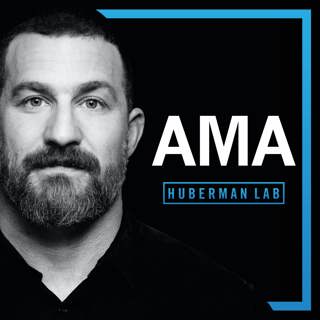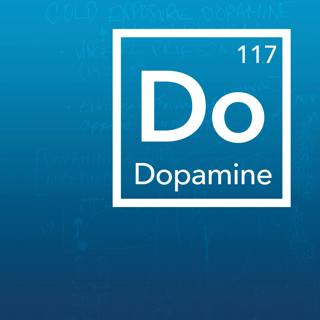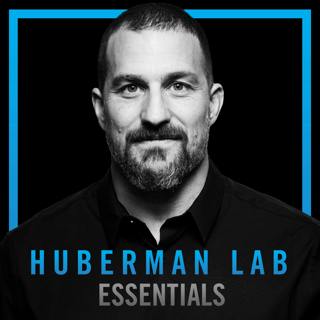
Dr. Noam Sobel: How Smells Influence Our Hormones, Health & Behavior
In this episode, my guest is Noam Sobel, PhD, professor of neurobiology in the department of brain sciences at the Weizmann Institute of Science. Dr. Sobel explains his lab’s research on the biological mechanisms of smell (“olfaction”) and how sensing odorants and chemicals in our environment impacts human behavior, cognition, social connections, and hormones. He explains how smell is a crucial component of “social sensing” and how we use olfaction when meeting new people to determine things about their physiology and psychology, and he explains how this impacts friendships and romantic partners. He explains how smell influences emotions, hormone levels, memories and the relationship between breathing and autonomic homeostasis. He describes how smell-based screening tests can aid disease diagnosis and explains his lab’s work on digitization of smell — which may soon allow online communication to include “sending of odors” via the internet. Dr. Sobel’s work illustrates how sensitive human olfaction is and how it drives much of our biology and behavior. For the full show notes, visit hubermanlab.com. Thank you to our sponsors AG1: https://athleticgreens.com/huberman LMNT: https://drinklmnt.com/hubermanlab Waking Up: https://wakingup.com/huberman Momentous: https://livemomentous.com/huberman Timestamps (00:00:00) Dr. Noam Sobel (00:04:03) Sponsors: LMNT & Waking Up (00:06:46) Olfaction Circuits (Smell) (00:14:49) Loss & Regeneration of Smell, Illness (00:21:39) Brain Processing of Smell (00:24:40) Smell & Memories (00:25:11) Sponsor: AG1 (00:29:07) Humans & Odor Tracking (00:39:25) The Alternating Nasal Cycle & Autonomic Nervous System (00:48:18) Cognitive Processing & Breathing (00:54:47) Neurodegenerative Diseases & Olfaction (01:00:12) Congenital Anosmia (01:06:19) Handshaking, Sharing Chemicals & Social Sensing (01:15:07) Smelling Ourselves & Smelling Others (01:22:02) Odors & Romantic Attraction (01:24:58) Vomeronasal Organ, “Bruce Effect” & Miscarriage (01:40:20) Social Chemo-Signals, Fear (01:50:26) Chemo-Signaling, Aggression & Offspring (02:03:57) Menstrual Cycle Synchronization (02:12:11) Sweat, Tears, Emotions & Testosterone (02:27:46) Science Politics (02:37:54) Food Odors & Nutritional Value (02:45:34) Human Perception & Odorant Similarity (02:52:12) Digitizing Smell, COVID-19 & Smell (03:05:50) Medical Diagnostic Future & Olfaction Digitization (03:10:55) Zero-Cost Support, YouTube Feedback, Spotify & Apple Reviews, Sponsors, Momentous, Social Media, Neural Network Newsletter Disclaimer Learn more about your ad choices. Visit megaphone.fm/adchoices
1 Mai 20233h 10min

AMA #6: Eye Health, Why We Yawn & Increasing Motivation
Welcome to a preview of the sixth Ask Me Anything (AMA) episode, part of the Huberman Lab Premium subscription. The Huberman Lab Premium subscription was launched for two main reasons. First, it was launched in order to raise support for the standard Huberman Lab podcast channel — which will continue to come out every Monday at zero-cost. Second, it was launched as a means to raise funds for important scientific research. A significant portion of proceeds from the Huberman Lab Premium subscription will fund human research (not animal models) selected by Dr. Huberman, with a dollar-for-dollar match from the Tiny Foundation. Subscribe to Huberman Lab Premium at https://hubermanlab.com/premium Timestamps (00:00:00) Introduction (00:01:53) What Are the Best Eye Exercises, Supplements, Food, Protection Practices for the Eye? (00:33:55) Huberman Lab Premium In the full AMA episode, we discuss: Why We Yawn and Don't Yawn During Sleep How to Stay Motivated and Overcome Lethargy in Learning Title Card Photo Credit: Mike Blabac Disclaimer Learn more about your ad choices. Visit megaphone.fm/adchoices
27 Apr 202336min

Science-Based Mental Training & Visualization for Improved Learning
In this episode, I explore the science of mental visualization and its application for learning motor and cognitive skills. I discuss neuroplasticity-based skill development and the roles of focus, sleep, movement restriction, and agitation. I then present five key principles of mental visualization to enhance learning speed, accuracy, and consistency. I also provide examples of specific protocols, including repetitions, rest periods, and session frequency, and how to adapt these methods for injuries or breaks from traditional training. Throughout, I reference the scientific studies supporting these concepts. This episode should allow anyone to learn or teach more effectively through the use of mental visualization and training. For the full show notes, visit hubermanlab.com. Thank you to our sponsors AG1: https://athleticgreens.com/huberman LMNT: https://drinklmnt.com/hubermanlab Waking Up: https://wakingup.com/huberman Momentous: https://livemomentous.com/huberman Timestamps (00:00:00) Mental Training & Visualization (00:05:01) Sponsors: LMNT & Waking Up (00:08:04) Developmental vs. Adult Neuroplasticity (00:11:42) Learning New Skills: Focus & Sleep (00:14:49) Long-Term Potentiation (LTP), Long-Term Depression (LTD) & New Skills (00:23:42) Principle #1: Very Brief, Simple, Repeated Visualization (00:26:35) Sponsor: AG1 (00:30:51) Principle #2: Mental Training Cannot Replace Real Training (00:37:36) Principle #3: Combining Real & Mental Training (00:43:17) Principle #4: Assigning Real-World Labels to Visualizations (00:50:37) Principle #5: Mental Imagery Equivalence to Real-World Perception (00:55:28) Tools: Effective Mental Training: Epochs, Repetitions, Sets & Frequency (01:05:00) Adding Mental Training; Injury, Travel or Layoffs (01:11:09) Timing of Mental Training & Sleep (01:15:17) Role of Gender & Age on Mental Training (01:17:10) First-Person vs. Third-Person Visualization; Eyes Open vs. Closed (01:23:53) Physical Skills, Motor Cortex & Cerebellum (01:31:15) “Go” & “No-Go” Pathways (01:34:19) Stop-Signal Task, Withholding Action (01:44:19) Aphantasia, Synesthesia; Social Cognition (01:52:58) Mental Training Practice & Benefits (01:57:36) Zero-Cost Support, YouTube Feedback, Spotify & Apple Reviews, Sponsors, Momentous, Social Media, Neural Network Newsletter Disclaimer Learn more about your ad choices. Visit megaphone.fm/adchoices
24 Apr 20231h 56min

Dr. Matthew MacDougall: Neuralink & Technologies to Enhance Human Brains
In this episode, my guest is Matthew MacDougall, MD, the head neurosurgeon at Neuralink. Dr. MacDougall trained at the University of California, San Diego and Stanford University School of Medicine and is a world expert in brain stimulation, repair and augmentation. He explains Neuralink’s mission and projects to develop and use neural implant technologies and robotics to 1) restore normal movement to paralyzed patients and those with neurodegeneration-based movement disorders (e.g., Parkinson’s, Huntington’s Disease) and to repair malfunctions of deep brain circuitry (e.g., those involved in addiction). He also discusses Neuralink’s efforts to create novel brain-machine interfaces (BMI) that enhance human learning, cognition and communication as a means to accelerate human progress. Dr. MacDougall also explains other uses of bio-integrated machines in daily life; for instance, he implanted himself with a radio chip into his hand that allows him to open specific doors, collect and store data and communicate with machines and other objects in unique ways. Listeners will learn about brain health and function through the lens of neurosurgery, neurotechnology, clinical medicine and Neuralink’s bold and unique mission. Anyone interested in how the brain works and can be made to work better ought to derive value from this discussion. For the full show notes, visit hubermanlab.com. Thank you to our sponsors AG1: https://athleticgreens.com/huberman LMNT: https://drinklmnt.com/hubermanlab Waking Up: https://wakingup.com/huberman Momentous: https://livemomentous.com/huberman Timestamps (00:00:00) Dr. Matthew MacDougall (00:04:22) Sponsors: LMNT & Waking Up (00:07:38) Brain Function & Injury; Brain Tumor Treatment (00:13:52) Frontal Lobe Filter; Sleep Deprivation (00:19:00) Neuroplasticity, Pharmacology & Machines (00:22:10) Neuralink, Neural Implants & Injury, Robotics & Surgery (00:27:52) Sponsor: AG1 (00:32:20) Neocortex vs. Deep Brain (00:36:45) Decoding Brain Signals (00:42:08) “Confidence Test” & Electrical Stimulation; RFID Implants (00:51:33) Bluetooth Headphones & Electromagnetic Fields; Heat (00:57:43) Brain Augmentation & Paralysis (01:02:09) Brain Implants & Peripheral Devices (01:12:44) Brain Machine Interface (BMI), Neurofeedback; Video Games (01:22:13) Improving Animal Experimentation, Pigs (01:33:18) Skull & Injury, Traumatic Brain Injury (TBI) (01:39:14) Brain Health, Alcohol (01:43:34) Neuroplasticity, Brain Lesions & Redundancy (01:47:32) Car Accidents & Driver Alertness (01:50:00) Future Possibilities in Brain Augmentation & BMI; Neuralink (01:58:56) Zero-Cost Support, YouTube Feedback, Spotify & Apple Reviews, Sponsors, Momentous, Social Media, Neural Network Newsletter Disclaimer Learn more about your ad choices. Visit megaphone.fm/adchoices
17 Apr 20231h 57min

The Science of Healthy Hair, Hair Loss and How to Regrow Hair
In this episode, I explain the biology of hair, hair growth, why hair growth slows and what causes hair to stop growing and/or “fall out.” I discuss the essential role of hair stem cells and other supporting biological factors for healthy hair growth. Then I describe various approaches (mechanical and chemical) to slow hair loss by increasing blood flow to hair stem cells, including minoxidil, tadalafil, PRP, microneedling, Botox and ketoconazole treatments. I also discuss how age-related hormone changes cause hair loss and explain the effectiveness of treatments such as caffeine, saw palmetto, growth hormone, finasteride and dutasteride. For all hair growth options, I describe potential side effects, how soon to expect results and the amount of hair regrowth to expect and I highlight effective combination treatments for hair regrowth even in hair “dead” (bald) zones. For many listeners, thinning, brittle hair, or pattern baldness are a source of anxiety and stress. This episode explains the mechanisms underlying hair regrowth tools and the science behind them so that you can evaluate potential treatments and associated side-effect profiles and select the best one(s) for you. For the full show notes, visit hubermanlab.com. Thank you to our sponsors AG1: https://athleticgreens.com/huberman LMNT: https://drinklmnt.com/hubermanlab Waking Up: https://wakingup.com/huberman Momentous: https://livemomentous.com/huberman Timestamps (00:00:00) Hair (00:04:29) Sponsors: LMNT & Waking Up (00:08:04) Psychological States & Hair (00:13:19) Hair Anatomy & Stem Cells (00:26:05) 3 Phases of Hair Growth (00:32:06) Sponsor: AG1 (Athletic Greens) (00:36:55) Minoxidil & Blood Flow (00:45:37) Increase Blood Flow: Massage, Tadalafil, Platelet-Rich Plasma (PRP), Microneedling (00:56:10) Microneedling, Minoxidil & “Dead Zones” (01:01:25) Botox Treatments (01:06:27) Androgens, Hair Growth & Pattern Hair Loss; Scalp vs. Beard Hair (01:15:46) Topical Caffeine & Slowing Hair Loss (01:21:06) IGF-1: Growth Hormone & Sermorelin; Insulin Sensitivity: Myo-Inositol (01:25:52) Iron & Hair Growth (01:27:04) 5-Alpha Reductase & Saw Palmetto; Curcumin (01:33:22) Ketoconazole & Offsetting Hair Loss (01:38:46) Topical & Oral Finasteride (01:51:00) Post- Finasteride Syndrome (01:56:01) Dutasteride (01:58:53) Mechanical & Chemical Stimulation for Hair Growth (02:02:46) Zero-Cost Support, YouTube Feedback, Spotify & Apple Reviews, Sponsors, Momentous, Social Media, Neural Network Newsletter Disclaimer Learn more about your ad choices. Visit megaphone.fm/adchoices
10 Apr 20232h

Dr. Elissa Epel: Control Stress for Healthy Eating, Metabolism & Aging
In this episode, my guest is Elissa Epel, Ph.D., professor and vice chair of the department of psychiatry at the University of California San Francisco (UCSF) and the author of a new book entitled "The Stress Prescription." We discuss her work showing how stress impacts mood, eating behavior, mental health, physical health, and aging. She explains stress intervention tools using “top-down” techniques (e.g., radical acceptance, mindfulness, reframing), body-based methods (e.g., breathwork) including the Wim Hof Method, exercise, meditation, body scans, and environmental shifts proven to help people cease unhealthy rumination patterns. We discuss how stress can positively impact psychology and sense of purpose, how stress affects cellular aging, how our narratives of stressful events impact our mood and biology, and how to effectively reframe stress. She explains science-based techniques to break stress-induced cycles of craving and overeating and thereby improve insulin sensitivity and metabolic health. Dr. Epel provides a wide range of tools shown to be effective in reducing stress and improving various aspects of our health. For the full show notes, visit hubermanlab.com. Thank you to our sponsors AG1: https://athleticgreens.com/huberman LMNT: https://drinklmnt.com/hubermanlab Waking Up: https://wakingup.com/huberman Momentous: https://livemomentous.com/huberman Timestamps (00:00:00) Dr. Elissa Epel (00:02:33) Sponsors: LMNT & Waking Up (00:06:18) Stress; Effects on Body & Mind (00:12:50) Tools: Overthinking & Stress (00:15:37) Acute, Moderate & Chronic Stress, Breathing (00:21:23) Stress Benefits, Aging & Cognition; Stress Challenge Response (00:27:23) Sponsor: AG1 (Athletic Greens) (00:32:19) Tool: Shifting Stress to Challenge Response, “Stress Shields” (00:37:400 Stress, Overeating, Craving & Opioid System (00:48:55) Tools: Breaking Overeating Cycles, Mindfulness (00:54:44) Soda & Sugary Drinks (01:00:51) Smoking, Processed Food & Rebellion (01:06:47) Tools: Mindfulness, Pregnancy & Metabolic Health (01:14:11) Body Scan & Cravings (01:17:28) Tool: Meditation & Aging; Meditation Retreats (01:23:35) Meditation, Psychedelics & Neuroplasticity (01:26:02) Mitochondrial Health, Stress & Mood (01:29:49) Chronic Stress & Radical Acceptance, “Brick Wall” (01:37:57) Tool: Control, Uncertainty (01:45:25) Stress Management, “Skillful Surfing” (01:50:25) Narrative, Purpose & Stress (01:52:49) Breathwork, Wim Hof Method, Positivity & Cellular Aging (02:03:11) Zero-Cost Support, YouTube Feedback, Spotify & Apple Reviews, Sponsors, Momentous, Social Media, Neural Network Newsletter Disclaimer Learn more about your ad choices. Visit megaphone.fm/adchoices
3 Apr 20232h 1min

Leverage Dopamine to Overcome Procrastination & Optimize Effort
In this episode, I explain how dopamine dynamics — meaning changes and interactions between our baseline and peak levels of dopamine drive our cravings and sense of motivation. I also explain how to leverage dopamine dynamics to overcome procrastination. I cover behavioral, cognitive, nutrition-based and supplementation-based tools to optimize baseline and peak dopamine levels to ensure a persistently motivated state. I also discuss how to boost motivation when you are in a rut, why you might not want to stack behaviors/substances that spike dopamine and how to build and maintain a “growth mindset” for pursuing goals of any kind. Dopamine is an incredibly powerful neuromodulator involved in basic functions (e.g., hunger, romantic attraction, etc.) and feats of cognitive and physical performance; by understanding the dynamics of dopamine, listeners ought to be better positioned to overcome procrastination, maintain motivation, and improve confidence. For the full show notes, visit hubermanlab.com. Thank you to our sponsors AG1: https://athleticgreens.com/huberman LMNT: https://drinklmnt.com/hubermanlab Waking Up: https://wakingup.com/huberman Momentous: https://livemomentous.com/huberman Timestamps (00:00:00) Dopamine (00:02:48) Sponsors: LMNT & Waking Up (00:06:27) Dopamine Brain Circuits (00:14:53) Goals & Addiction (00:17:13) Dopamine Dynamics, “Wave Pool” analogy (00:20:28) Craving, Motivation, Pursuit & Reward Prediction Error (00:24:46) Sponsor: AG1 (Athletic Greens) (00:29:40) Feedback Cues & Reward Contingent Learning, “Scoreboard” (00:37:40) Addiction; Pleasure & Pain Imbalance (00:44:55) Dopamine Release & Addictive Substances/Behaviors (00:50:43) Addiction Recovery, Binding Behaviors (00:53:25) Tools: Maintain Baseline Dopamine Levels (01:03:26) Tool: Deliberate Cold Exposure & Dopamine (01:09:38) Prescriptions & Supplementation: L-Tyrosine, Mucuna Pruriens (01:18:58) Dopamine Trough Recovery, Postpartum Depression (01:23:31) Dopamine Dynamics, “Dopamine Stacking”; Intrinsic Motivation (01:38:10) Making Effort the Reward, Growth Mindset (01:41:49) Tool: Overcome Procrastination (01:52:16) Tool: Meditation & Procrastination (01:57:01) Zero-Cost Support, YouTube Feedback, Spotify & Apple Reviews, Sponsors, Momentous, Neural Network Newsletter, Social Media Disclaimer Learn more about your ad choices. Visit megaphone.fm/adchoices
27 Mar 20231h 54min

AMA #5: Intrusive Thoughts, CGMs, Behavioral Change, Naps & NSDR
Welcome to a preview of the fifth Ask Me Anything (AMA) episode, part of the Huberman Lab Premium subscription. The Huberman Lab Premium subscription was launched for two main reasons. First, it was launched in order to raise support for the standard Huberman Lab podcast channel — which will continue to come out every Monday at zero-cost. Second, it was launched as a means to raise funds for important scientific research. A significant portion of proceeds from the Huberman Lab Premium subscription will fund human research (not animal models) selected by Dr. Huberman, with a dollar-for-dollar match from the Tiny Foundation. Subscribe to Huberman Lab Premium at https://hubermanlab.com/premium Timestamps (00:00:00) Introduction (00:01:53) Strategies for Abstaining From Addictive Thoughts and Narratives (00:21:07) Huberman Lab Premium In the full AMA episode, we discuss: Continuous Glucose Monitors (CGMs) How to Build Good Habits Alongside a Partner Who Challenges Them? Short Naps vs. Non-Sleep Deep Rest (NSDR) for Replenishing Energy and Dopamine Title Card Photo Credit: Mike Blabac Disclaimer Learn more about your ad choices. Visit megaphone.fm/adchoices
24 Mar 202323min





















